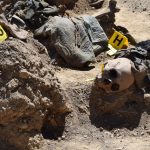Decades of conflict have blanketed Afghanistan with mass graves. The vast majority have never been exhumed, leaving families without the knowledge of how their loved ones died, and the country unable to move forward with a process of national healing.
PHR’s work around the globe has shown us that the objectivity and transparency of forensic techniques is critical to creating an accurate record of the past. This record can pave the way for justice for victims, accountability for perpetrators, and a chance for the community to tell the truth about its dark past.
PHR has been investigating human rights violations in Afghanistan since 1997. We have used our forensics expertise to press the government and support civil society to investigate mass atrocities and other human rights abuses in order to heal the nation and create a more stable society.
In 2011, PHR helped form the Afghanistan Forensic Science Organization (AFSO), the country’s first independent group of forensic investigators. AFSO is working to strengthen Afghanistan’s justice system by mapping and registering mass grave sites throughout the country, and training representatives of the government and NGOs in crime scene documentation.
AFSO, supported by a PHR scientific brief, is also challenging “virginity testing,” the practice of examining a woman’s hymen to determine her sexual history. These illegitimate, abusive, and unscientific procedures were banned in 2016, but continue to be widely used in Afghanistan, and their results are used as evidence to convict and imprison women for alleged adultery. In July 2018, an official public health policy was put in place to stop the practice from being performed in any clinic or hospital in Afghanistan, but despite the policy, the exams still take place. PHR continues to fight for an end to these exams and to call for the release and exoneration of girls and women who have been imprisoned as a result of this abusive procedure.
PHR has extensively researched women’s health and human rights in Afghanistan and documented how the Taliban’s restrictions on women’s access to medical care, education, and employment created a dire health and human rights crisis in the country.
Our past work has also involved investigations into the abuse of detainees captured in Afghanistan during the United States’ “war on terror” and we continue to call for accountability of those who authorized and carried out the abuse. We also continue to call for a full investigation into an alleged massacre of as many as 2,000 Taliban prisoners who surrendered in November 2001 to U.S. and Afghan forces, and are believed to have been suffocated in trucks and buried in the desert at Dasht-e-Leili in northern Afghanistan.


